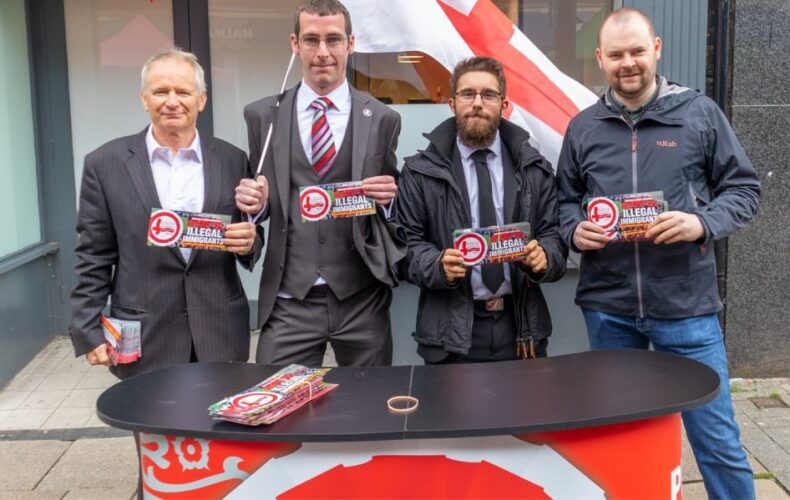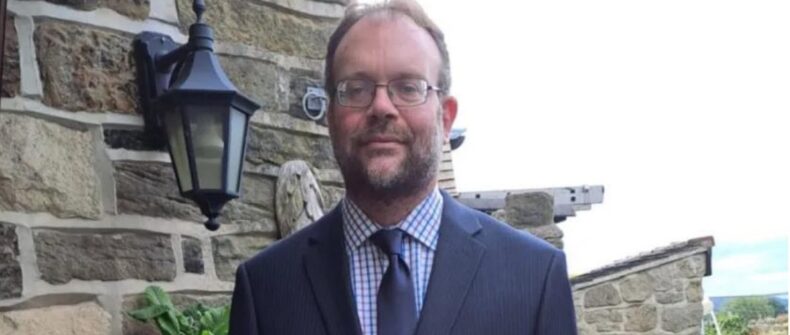
By Paul Gale
It’s understandable for Labour Party members to be euphoric this morning. And anti-fascists outside Keir Starmer’s party might also be tempted to join in the celebrations and avoid looking too closely at the overnight results. That would be a mistake.
After years of deliberate pandering to culture war rhetoric (in other words, “respectable” racism and homophobia) the Conservative Party has suffered a landslide defeat.
Nigel Farage’s dog-whistle racism and despicable recycling of Putin’s propaganda lines has left Reform UK with five seats, about the same as the Greens and Plaid Cymru. It’s five too many, but far short of what he hoped for and some polls were projecting.
George Galloway’s attempt to create a Strasserite movement by combining concerns over Gaza with “culture wars” proved a dismal failure, and gave us one of the best moments of election night television when Neil Kinnock, a longstanding anti-fascist campaigner, was rightly able to celebrate the defeat of the arch-opportunist Galloway.
UKIP, whose stunning collapse during the six-week election campaign, involving the resignation of several officials including their own newly elected leader, has been exposed in detail by Searchlight, had almost uniformly pathetic votes. The one exception was the Staffordshire constituency of Stone, Great Wyrley and Penkridge, where UKIP saved their deposit with 6.2% thanks to the absence of Reform UK.

David Kurten in happier times with Nigel Farage
Conspiracy theorist and culture warrior David Kurten, once of UKIP and now leader of the Heritage Party, finished bottom of the poll in Bognor Regis and Littlehampton with 1.5%, while the other forty candidates for his party polled between 0.1% and 0.7%.
The perennial Islamophobe and ex-Tory Brian Silvester, once part of Anne Marie Waters’ For Britain Movement and now standing for his own “Putting Crewe First” party, took only 1.2% in Crewe and Nantwich. An assortment of far-right independents were equally dismal failures. Former Griffin bodyguard and notorious Merseyside gangland enforcer Joe Owens polled 0.3% in Liverpool Wavertree, ex-BNP organiser Andrew Emerson fared only slightly better with 0.4% in the latest of his many candidatures in Chichester, David Durant (a relic of Patrick Harrington’s faction in the 1980s’ NF splits, who has now reinvented himself as a community activist) polled 0.8% in Hornchurch and Upminster, and former Tory MP Andrew Bridgen (whose conspiracy theorising led him into short-lived alliance with Laurence Fox) made a fool of himself by losing his deposit with 3.2% as an independent in his old constituency, NW Leicestershire.
And every single candidate from the various conspiracist and extremist parties to the right of Farage – including the four candidates from Mark Collett’s nazi gang Patriotic Alternative, standing under the sickeningly misnamed ‘English Democrats’ label – lost their deposit. As with UKIP and Heritage, most of these borderline or blatant fascists polled not just below 5% but below 1%.

Craig Buckley (above, second left) the PA nazi standing under two different labels yesterday, polled 6.8% as independent candidate for the Leigh South ward of Wigan Council, but only 0.9% as English Democrat candidate for the Leigh and Atherton parliamentary seat. The difference was mainly due to Buckley having Reform UK opposition in the parliamentary election, but not in the council by-election.
The best outright fascist General Election result was 3.7% for ‘British Democrat’ Frank Calladine (below) in Doncaster North, who had no Reform opposition. His campaign team included former BNP councillor Jim Lewthwaite as well as British Democrat president Andrew Brons, a veteran of the nazi scene dating back to Colin Jordan’s National Socialist Movement. Despite grandly advertising their status as “parish councillors”, two of the Brit Dems’ NEC members – former BNP activists Chris Bateman and Lawrence Rustem – managed only 0.9% and 0.4% in their Essex and Kent constituencies, while the party’s newest recruit Gary Butler took only 0.3% in Maidstone.

Labour strategists may be tempted to sit back and enjoy divisions on the right, especially as contenders for the Tory leadership debate whether they should move further in Farage’s direction.
The cynical short-term response would be for Labour to avoid talking about issues, and not risk offending Reform supporters.
But the lesson of the Blair years is that this is a very dangerous game. In 1997 the New Labour landslide disguised long-term problems in some traditional Labour areas, where the Tyndall-era BNP was already starting to rebuild the far right’s electoral strength from its rock bottom years in the 1980s.
In Lancashire and Yorkshire mill towns especially, the BNP was starting to sink roots by the late ‘90s. Soon after Nick Griffin’s takeover of the party, it was able to profit from racial tensions, beginning to save parliamentary deposits and win council seats. Despite many internal problems (many due to Griffin’s own corruption) the BNP ended up with dozens of councillors and two Members of the European Parliament.
It was only thanks to a combination of determined anti-fascist campaigning, investigation by Searchlight and internal BNP factionalism that the party eventually collapsed.
In 2024 some of Reform UK’s strong votes are in the same areas where the BNP once had councillors, or strong branches that briefly became the main challengers to Labour.
Though not coming near to defeating Labour, yesterday Reform polled 19.3% in Oldham East & Saddleworth, 19.5% in West Bromwich, 22.5% in Bradford South, 24.4% in Stoke North, 26.1% in North Warwickshire & Bedworth, 26.4% in Dudley, 28.7% in Amber Valley, 30.3% in Rotherham.
One of the old BNP’s few intellectuals, Kevin Scott, pointed out on X/Twitter that Reform UK has become the main opposition to Labour across a large part of North East England, including Scott’s home city Sunderland.
It’s not good enough for anti-fascists to rely on the electoral system to keep out fascists. First-past-the post can under certain circumstances allow the far right to win, if their opponents’ votes split in a particular way.
More likely though is that for other reasons there will be pressure for electoral reform.
In that case, the only sure way to keep the far right out of power is to take them on directly, not to avoid issues of principle in the 1990s Clinton-Blair approach of “triangulation”.
Not pandering to Reform voters, nor empty sloganising but by patiently and consistently explaining how they have been exploited by Farage’s dog-whistles.
There’s some evidence that during the last week of the campaign, Farage started to lose support to both the Tories and Labour, because of his own mistake in repeating Russian propaganda arguments, and the cumulative effect of repeated revelations about vile racism among his candidates.
In the new Parliament, the Reform leader and his handful of fellow MPs should be relentlessly exposed for what they are. Looking for entertaining television during a sometimes drab election campaign, broadcasters have sometimes seen Farage as a ratings boost, as Trump was seen in the US.
What’s needed now is more of the serious scrutiny that the BBC’s Nick Robinson gave to Farage during his interview late in this year’s campaign.
And while the media and Westminster politicians hold Farage up to scrutiny, campaigners up and down the country should prepare to take on either Reform UK, or any revived fascist party that tries to play the same tunes in local elections during the next few years.
At least four rival factions of old-school fascists and nazis are trying to build up credible parties. Searchlight is aware of several debates, training seminars, and backroom negotiations planned for the next few weeks and months. We can’t assume that the pattern of vicious factional splits will continue. Reform UK’s votes yesterday – even if they could be seen as “protest votes” – will be seen by the rest of the far right as evidence that a modern version of the BNP or NF could take off rapidly.
